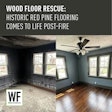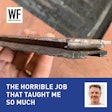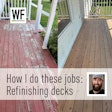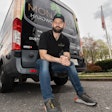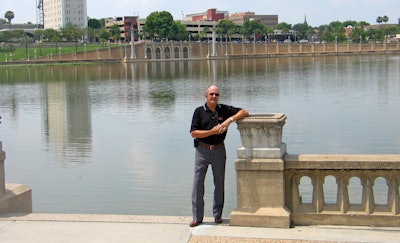
 On the promenade at Lake Mirror in Lakeland, Fla., wood flooring contractor Paul Williford takes a short break from his day's job-site visits and client meetings.
On the promenade at Lake Mirror in Lakeland, Fla., wood flooring contractor Paul Williford takes a short break from his day's job-site visits and client meetings.Paul Williford doesn't start work real early these days. He doesn't swing a mallet, run a sander or apply finish anymore, either. He usually gets to his wood flooring retail store on Lakeland's Hwy. 98 at about 9 a.m. He'll consult with his store employees for a bit, perhaps check in with a supplier for a job he has lined up in a week, and then he typically hits the road for a day's worth of residential flooring estimates. It's not that he's above the type of hard work wood flooring installers do every day, it's just that, at 65 years old, he's earned a pass from the day-to-day hard labor. Earlier this year, Hardwood Floors spent a day on the job with Williford, who is a second-generation wood flooring contractor. As the day transpired, it became clear that, for the past few decades, Williford has led a company founded on old-fashioned values like respect, service and integrity.
9:30 a.m.
 Williford takes measurements during an initial client meeting for a staircase remodel job. Most of his appointments like this are the result of radio advertising or an Internet search.
Williford takes measurements during an initial client meeting for a staircase remodel job. Most of his appointments like this are the result of radio advertising or an Internet search.He exits the interstate and starts paying closer attention to street names. While he discusses his business practices, the monotone GPS pronounces the passing roads of Sherwood Forest: "Little John's Trail," "Kinsman Way," "Yeoman's Path," etc. In the style of the suburbs, there are loops and cul-de-sacs aplenty. "These roads will mix you up," he says. "If you're not on these roads a lot, they are hard to get through." Luckily, Williford is on them a lot. He was born and raised in Lakeland and lives nearby. "We moved out here about 20 some years ago," he says. "It was all woods, and it was really, really nice. And all this has slowly come in. It's good because I've done a tremendous amount of work in what's called Sherwood Forest. Sometimes, though, I would almost rather see what's back there"-that's the forest-"and get the work somewhere else."
Inside the home of the day's first client, Williford, wearing western-style pants, cowboy boots and a golf shirt, introduces himself and is shown the staircase. He and the homeowner go back and forth on wood options, work schedules and job expectations. To her questions, Williford alternates between responses of "Yes, ma'am" and "No, ma'am." The homeowner's young daughter makes repeat trips up and down the stairs, and Williford takes opportunities to get various measurements. He counts the stairs. With the relationship established and the work outlined, Williford departs and commences to pound the pavement on the way to his second stop of the day due further east in Winter Haven.
11 a.m.
 Williford inspects the clear maple border and red oak field at a repair job his company handled for a repeat customer.
Williford inspects the clear maple border and red oak field at a repair job his company handled for a repeat customer.
After merging back onto I-4 for a stretch, Williford explains the territory his company works within. His company is located inside Florida's "I-4 Corridor," a densely populated region of the state that, following the contours of I-4, begins in Daytona Beach on the Atlantic Coast, runs southwest through Orlando and Lakeland and ends in Tampa Bay on the Gulf Coast. Around Lakeland and neighboring Winter Haven, it's sometimes tough to tell where one city ends and another begins. But he doesn't confine himself to the I-4 Corridor alone. Williford's company will work as far north as Gainesville and as far south as Naples, and he'll do work on either coast. All in all, he'll take jobs within an area that is roughly 32,000 square miles, an area equivalent to the size of South Carolina.
In Winter Haven, Williford checks on a repair job two of his mechanics have just finished. In the dining room, the client had a moisture problem that ruined an angelique teak floor. Williford's workers tore out the ruined material and installed new 2¼-inch select red oak with a clear maple border. "I would've loved to have reinstalled the teak," he says, "but you can't get it anymore." The client here, a doctor, is a repeat customer of Williford's, which is something this company has come to expect after being in operation for 66 years.
Williford's father, Mark Williford, started the company in 1946. In typical fashion, Paul Williford was introduced to the business at an early age. He recalls going to the job sites around first or second grade, and his dad would let him ride the buffer. "That was the biggest deal," he says. "He'd roll up a towel so my fanny wouldn't get hot and I'd sit on there. I'd sit down and hold onto the pole, and he would start up that buffer and buff the floor. So that's how I got started. That was so cool." Next, when he was about 10 or 11, his dad started picking him up from school and then bringing him to the job site to work. Williford's first job on a wood floor was, not surprisingly, hand-scraping corners.
 Wearing a Bluetooth earpiece and with a GPS navigator on his dash, Williford stays connected with his employees and lessens his chances of getting lost in Lakeland's winding suburbs.
Wearing a Bluetooth earpiece and with a GPS navigator on his dash, Williford stays connected with his employees and lessens his chances of getting lost in Lakeland's winding suburbs."My job was to go around and scrape corners and then broom-sweep the whole house, most of the time twice to get the dust off. Then after every buffing on a coat, I would have to go back and sweep it again. If I did something wrong or I wasn't doing it right, I get popped in the head, just like DiNozzo on NCIS. He'd pat me on the head and say, 'Go back over that again.'"
 Williford takes notes during a meeting of one of the two civic clubs of which he is a member. That day the President's Roundtable decided on recipients for college scholarships and public safety servant awards.
Williford takes notes during a meeting of one of the two civic clubs of which he is a member. That day the President's Roundtable decided on recipients for college scholarships and public safety servant awards.Through it all, Williford learned how to run a business the way his father ran it. His six floor mechanics work by the hour, and he doesn't use subs. "I control it better if they're my hourly employees. What I do does not get out to another company because the sub would work for me today and another company tomorrow," he says. "We've always been that way." When his employees talk with customers, it's always "Yes, ma'am" and "No, ma'am." He's thorough with his customers, and his bids are typically more expensive than his competitors'. "My mechanics get paid better, and so they do a better job. That's what we do. I have people that come to me and say, 'My goodness, you are $300 or $400 more expensive,' and I say, 'Yup. But is the other company going to do this? No. Is the other company going to do this? No, they didn't say anything about it. Well, we are. That's the difference.'" Asked whether he learned these values from his father, Williford replies, "Oh yeah. If I didn't stick to those values, he'd roll over in his grave. I'd see him in my dreams!"
Noon
After consulting with his workers in Winter Haven, Williford drives back to downtown Lakeland for a meeting at Lanier Upshaw Insurance. He's not here to discuss insurance options; instead, he's here to participate in a meeting for the President's Roundtable. Early each year, the group convenes to organize the city's Public Safety Awards Luncheon during which public servants are recognized for going above and beyond their call of duty. To participate in the President's Roundtable, Williford serves as president of the local chapter of Sertoma International, a charitable club devoted to the service of others. As evident in Williford's involvement in the two clubs, he is just as devoted to service as he is to preserving the methods his father used to conduct business.
The way Williford tells it, the President's Roundtable has the "unfortunate job" of picking a few public safety honorees each year from a large pool of deserving people. Here's just one example: "We had a fireman on the job; there was an automobile accident. The fire department beat the paramedics there, and there was a guy trapped in one car. The guy was bleeding; he had a ruptured artery. The fireman reached in and pinched it and held it. When the paramedics got there, he would not let go. He said, 'I will go to the hospital with you.' He loaded up in the ambulance, right along with this guy, with his hand in his chest pinching, and he rode all the way to the hospital and into the emergency room. And the guy lived. If he had not done that, the guy would have certainly died. That's above and beyond."
Mostly, Williford's Sertoma branch-Sertoma is an acronym for the phrase "service to mankind"-goes to public events and cooks food for attendees; he stores the club's grill in his supply warehouse. The club is small at 13 members, but Williford says they are very devoted. "When we work something like that," he says, "we have 13 members show up to work."
2 p.m.
On the way to the day's fourth stop-another home in Lakeland-Williford takes a scenic route and pilots his SUV around some of his city's best features-its lakes. Florida has more lakes than any other Southern state, and the majority of them are located in its central region. Most are natural, yet many within Lakeland are actually filled phosphate mine pits. Looping around the various lakes, Williford acts as tour guide, pointing out some of the city's best landmarks. His knowledge of and enthusiasm for his city gives away the pride he feels for his hometown, the pride he takes in his company having done its part to help build it. At Lake Hollinsworth, Williford tells the story of how Lakeland's last swan was killed by an alligator in 1954 and how a local resident wrote Queen Elizabeth asking for a replacement flock. The queen obliged and sent over a pair descended from swans allegedly given to King Richard the Lionheart, and some from that stock remain in Lakeland today. Driving past the campus for Florida Southern College, Williford beams as he relates how the school is actually home to the largest single-site collection of architecture by Frank Lloyd Wright. He's glad to also point out the headquarters for Publix supermarkets, which is headquartered in Lakeland and is the city's largest employer. No doubt, Williford has gotten a lot of business over the years due to the company's-and thereby the city's-growth.
All this makes it surprising to learn how, when he was a young man, Williford resisted being a part of his father's company. This sentiment is rooted in an episode from high school. It was time for his baseball team's conference tournament, and Williford was looking forward to helping lead his team to a championship playing shortstop and pitcher. "One afternoon, my dad called school and he said, 'I'm sorry but I need you to work this afternoon,'" Williford says. "The bottom fell out." Today Williford is more flexible in his scheduling, but "back then you couldn't do that. That was the work ethic that older people had. You had to work or you wouldn't eat, or pay this bill. If he [his father] waited until the next day, then the job he was going to start the next day would be behind. I missed the tournament, and I said, 'I'll never get into this business.' He didn't do it to be hateful-he was apologetic-but he didn't have a choice." Later on, after Williford had left the military and returned home to work, he worked in various manufacturing sectors, including making tile and machining. "I didn't care as long as it wasn't floors!" he says.
Eventually, tragedy struck. "Wound up, my dad had a heart attack-it was either do this, or let it [the company] go. I went back in to keep this alive for a while, and"-he laughs-"now it's 40 some years later, and we're still trying to keep it alive, to keep it going." Clearly, the company's prosperity, brought on by his father's guidance, ended Williford's resistance to working in the wood flooring industry. "It's been good. I can't complain."
2:30 p.m.
 Surrounded at his desk by company awards, NWFA certifications, a collection of sticky notes and golf paraphernalia, Williford discusses a supply order delivery.
Surrounded at his desk by company awards, NWFA certifications, a collection of sticky notes and golf paraphernalia, Williford discusses a supply order delivery.In another of Lakeland's residential enclaves, Williford pulls up to his fourth stop of the day. His client wants a wood floor installed inside a workshop in her backyard. Inside her home, the client has all santos mahogany flooring, "but out here she did not want santos mahogany," he explains. "She wanted to use something a little different, so we are giving her an 18-by-18-by-¾-inch unit-block floor made with red oak. We will glue the floor down, bleach it all, and then we're going to stain every other square black or white to make a checkerboard effect. And then we will put four coats of waterborne urethane on top of it." The job has yet to start; Williford just wanted to drop by here to check on things before he sends his crew.
3:30 p.m.
His visits completed for the day, Williford drives back to the shop and warehouse on Hwy. 98. Inside, he confers with his wife, Loretta, on the day's events. While he was driving all day around central Florida, Loretta stayed in the shop to help walk-in customers. While staffers pepper him with questions about various projects, Williford takes a seat at his desk and meticulously goes over delivery orders. He's thorough in this since he has a policy of not picking up his supplies; rather, he pays the typical $65 delivery charge for distributors to deliver materials to his shop. "I can't pay a man to drive the truck-and fuel costs-to go pick it up for that much," he says. "As long as we get our orders in at the right time, we get everything brought to us. It's never made sense to me, lining up a job for a particular day, and driving to the distributor that day to pick up supplies. Say it takes you 30 minutes to drive there, and 30 minutes for the distributor to load you up, and then you have 30 minutes to drive to the job. Look at how much time you've wasted. With a job like that, you may get to work at 10 o'clock. Meanwhile, my guys have already been working since 7 o'clock. My guys are going to be happier because they get off work earlier, and my customer is happier because we get out of her house faster. Why send an installer every day to go get supplies?"
It's values and company policies like this one that have seen Williford's company through the ups and downs of the flooring business and the greater housing industry. The state in which he operates is one of the housing bust's biggest losers, yet his company is still here, still thriving. Through 66 years of business, he and his father developed a tried-and-tested method of business based on customer service and integrity, and it doesn't appear Williford will be changing things soon.





















